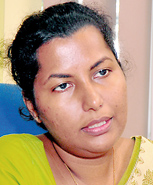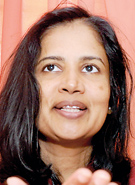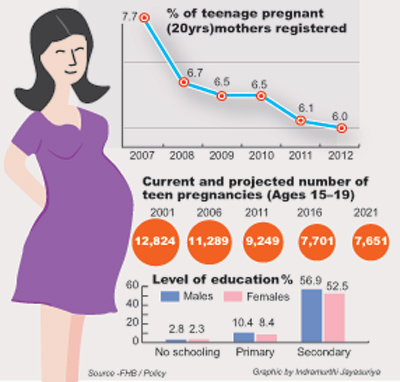News
The growing problem of teenage mothers
- Poverty, alcoholism, unstable families and lack of proper sex education; the main reasons, say health officials
- Pregnancies due to rape, incest on the rise
It’s an inconvenient truth–but the increasing number of teenage pregnancies is a troubling concern for both state authorities as well as social workers. Among the reported cases this year, girls as young as 11-years of age have become pregnant, falling victim to abuse and in many cases, incest.
According to Family Health Bureau (FHB) statistics, on average, 20,000 females below the age of 20 become pregnant each year. Experts in the area say the main reasons are poverty, alcoholism, unstable family relationships and lack of proper sex education.

Dr. Manjula Danansuriya
“We have seen an increased number of child pregnancies in areas such as Batticaloa, Puttalam, Anuradhapura and Colombo during the past few years, with Batticaloa reporting 11.2%, Puttalam 9.6%, Anuradhapura 8.5% and Colombo 6.7%. We observed that the main reason was the poor socio-economic condition of the homes of the teenage mothers,” Consultant Community Physician- Adolescent Health of the Family Health Bureau, Dr. Manjula Danansuriya said.
“In most cases the mothers of these girls have gone abroad for employment and this leaves the young girls vulnerable to needless advances from those who are around them,” she said. Dr. Danansuriya pointed to another factor—a high number of young mothers where there was a bigger population of Muslims. “Since these girls are encouraged to get married at an early age there are many teenage pregnancies reported in areas such as Batticaloa and Puttalam,” she said.
In Colombo, she said, teen pregnancies were prevalent among the urban slum population where there was a high rate of school dropouts and lack of proper sex education. However the estate sector in the country reported the highest number of teen pregnancies with the most vulnerable age being between 15-18 years.
In another disturbing observation Dr. Danansuriya said the mothers of these teen mothers too had got pregnant early in their lives “This is like a vicious cycle. In most of the cases we have come across we saw the tendency of the mother of the teenager having children at a very early age and thus she would not oppose her daughter marrying at an early age.”
Meanwhile, a study conducted by the Department of Community Medicine, University of Colombo, revealed that local schools did not have a conducive environment for sex education or how to avoid unnecessary advances from the opposite sex.

Bianca Abeygoonawardena
“When it is discovered that a student is having a love affair with a teacher, other teachers and students look at them in a peculiar manner. These students are punished or even thrown out of the school without being told why it is wrong to behave in such a manner,” Dr. M. C. Weerasinghe of the Department of Community Medicine said.
He said the study also showed many teenagers had got entangled in untoward relationships and situations merely by communicating on mobile phones. He said many were the instances where adolescents had eloped after carefully planning everything via the mobile phone.
Pointing out to another loophole Mr. Weerasinghe said, “Our legal system has problems of its own too. We found that in some cases the Registrar had married an under aged person stating that the two parties had come to an agreement sometimes even going to the extent of forging birth certificates. These incidents are taking place quite often, he said adding that a control mechanism should be in place to stop it.
Dr. Weerasinghe said although the legal age for marriage was 18 years, pregnancies should be delayed till at least the early 20s as it is proven that a woman who is in her teens is not prepared physically or psychologically to have a baby. “Early pregnancies can cause psychological problems for the young mother depriving her from finishing her education and more importantly not being mentally prepared to bear the responsibilities of being a mother,” he said.
Meanwhile, according to Sarvodaya Suwasetha Sewa Society Director, Bianca Abeygoonawardena, there is an increase in the number of pregnancies caused by incest relationships. “Most of the teenage mothers come from unsettled families where the mother is working abroad or are from separated families. Also the attitude of a father plays a focal role,” she added.
Ms. Abeygoonawardena said that in most cases involving incest relationships a daughter was being exploited by the father, step father, sibling or a close relation because of the absence of a mother . “When the relationship between the father and mother is not strong the father sometimes turns his attention on the eldest daughter. In some cases the father has been sexually abusing the daughter for a long period of time before the mother gets to know or the victim seeks help,” she said.
In some instances, she said, because of the poverty of these families the daughter keeps silent for fear that the father would be taken in by the police thereby depriving the family of a breadwinner. “Sometimes the mother also tries to keep the pregnancy a secret or is threatened by the father to keep it concealed. Because of this fear, the pregnancy doesn’t come to light.”
She said they have come across victims who are younger than 15 years of age. Some girls, she said, don’t even know that they have been raped or pregnant until a long time has lapsed.
“We see that the lack of a healthy relationship between family members affect teenagers in many ways. Even in the urban setting when children do not have someone to talk to, they involuntarily get drawn to affairs and even sexual relationships with people who show the slightest interest in them,” she warned.
She said in cases where young pregnant mothers have sought the assistance of their centre, the babies are given for adoption with the mothers consent. If not, she said, the babies are transferred to a Children’s Home until the mothers are old enough to look after them.
“If the mothers of the teen mothers agree to look after both teenager and her baby we allow them to take the responsibility. But in most cases they themselves come from very poor families so we advise them of the consequences before they take such a decision,” she said.

At the home run by Sarvodaya Suwasetha Sewa, Ma Sevana, the girls are given counselling and vocational training to help them improve their living standards. Some girls stay in the facility for as long as two years, Ms. Abeygoonawardena said adding that in many cases the teen mothers are willing to go back to school and finish their education as well.
She said most of the teenage mothers who come to their centre were from Kurunegala, Galle, Hambanthota and Anuradhapura.
“A child mother is a normal person and they should be given the full right to function as an ordinary person in society with all rights and freedom,” she said adding that the lack of sex education at school level had contributed immensely to the increased number of preganancies.
“Teachers play an important role in a child’s life. If our school teachers could get close to the children, observe them and listen to their problems these situations could be limited in many ways,” she said adding that sex education should start as early as from grade one with children being taught the importance of saying no to unwanted advances.
Younger the mothers, greater the risks
Since teenage mothers are themselves still growing they run a higher risk of dying at child birth compared to mothers who are above 20 years of age. They also run the risk of developing induced hypertension, anaemia and other pregnancy-related complications. Teenage mothers could also be more vulnerable to developing ante natal and post natal psychological problems which could lead to depression, a health official warned.
Dr. Danansuriya of the FHB said teenage mothers were vulneranle to suicide too due to impulsive behaviour.Teenage pregnancies could also result in low birth weight of babies and other complications such as intra uterine deaths, intra uterine growth failures and pre term deliveries, she said.
“As the teenage mother has not developed physically to bear a child properly she will find it hard to provide a safe, secure, attuned and sensitive attachment for her baby. This could result in an adverse affect on the physiological development of the newborn,” Dr. Danansuriya said adding that sometimes these problems may lead to detachment of the mother from the child and lead to breast feeding problems. She explained that these could later lead to delinquent behaviours in babies born to teen mothers.
De Soysa Maternity Hospital turns marriage broker
One of the leading state-run maternal homes in the country, the De Soysa Maternity Hospital has seen its fair share of teenage pregnancies with at least five deliveries recorded each month. The hospital recently took the unusual step of registering the marriages of two unwed teen mothers soon after they delivered their babies. One such wedding took place yesterday while the other a week ago.
One of the girls, Shanika Sudharshini Perera turned 18 on the 30th of last month, a day after she gave birth to a healthy baby boy. Her partner, 21 year old Vipul Sampath from Wellampitiya, was thrilled about the birth. “I usually get information regarding teen mothers who come for their confinement to the hospital. They are usually too young to be legally married but when I heard that this mother turned 18 I requested them to get married,” hospital Director Dr. Dhammika Jayalath said.She said initially the couple had refused to get married as they didn’t have enough money. “The hospital staff collected money and arranged the whole ceremony. Both the families were happy about the event and so were we,” she said.
Dr. Jayalath and Senior Obstetrician and Gynaechologist Dr. Neil Seneviratne signed as witnesses at the registration.
Dr. Jayalath said they see around five-six teen pregnancies a month. “Teen pregnancies aren’t healthy and they have consequences. They are unnecessary and in addition there is a huge social stigma around underage moms. The ceremony should not be seen as an encouragement. However, since such pregnancies do take place we provide all services and care to the young mother and the baby,” she said.
The young mother Shanika speaking to the Sunday Times said as a couple they were happy about the son’s birth. “But we are also facing economical problems too. Bringing up a baby is not easy,” she said.
“The reason for teenage pregnancies is the lack of proper sex education. If young people are taught about contraception and other means of protection, under-aged girls wouldn’t get pregnant,” Shanika said.

